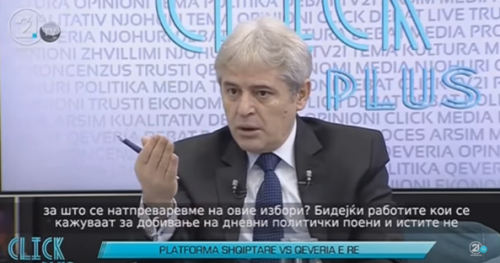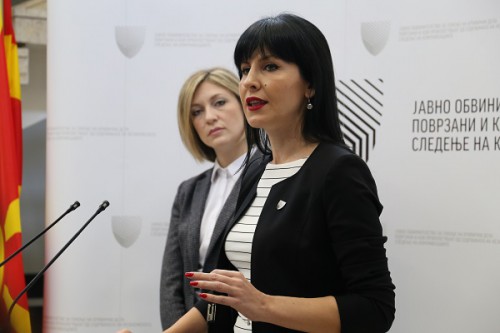Macedonia, even after over a month has passed since the elections, still has no government. Designate Nikola Gruevski, leader of VMRO-DPMNE and former Prime Minister of Macedonia (resigned a year ago, as part of the items contained in the Przino Agreement) failed to form a new government, although his party won 51 seats at the early parliamentary elections that were held on December 11, 2016.
The first clear signal indicating that he has lost the citizen’s confidence after 10 years of ruling, came immediately after the elections, with the 10 seats that are lacking as a requirement for a parliamentary majority. And he received the second clear signal, coming from the ethnic Albanian parties in Macedonia, last night with DUI’s decision not to coalition with VMRO-DPMNE. Without DUI’s 10 seats, Gruevski and VMRO-DPMNE have lost the opportunity to remain as a ruling party. Political analysts also point out to possible agreements between longtime political partners Gruevski and Ahmeti, in order to prevent President of the state Gjorgje Ivanov of handing over the mandate to a member of a party that will provide parliamentary majority, which in this case would be SDSM, with the next designate being – leader Zoran Zaev.In any case, there is no doubt that Gruevski is no longer a crucial figure on the Macedonian political scene.

DUI adheres to the Platform
The platform that was adopted after the elections (on January 7, 2017) by three of the ethnic Albanian parties in Macedonia, following consultations with Albanian Prime Minister Edi Rama and Kosovo President Hashim Thaci is imperative for DUI, as one of the parties that are signatory to the document. DUI did not reach an agreement with VMRO-DPMNE in relation to the points in the Platform, and as the spokesperson of the party announced at a press-conference in front of the party’s headquarters in Mala Recica, that is why it will not coalition with its longtime political partner. According to Bujar Osmani, the five options further remain on the table, which are being considered by the Presidency, and they are: for DUI to coalition with VMRO-DPMNE, with SDSM, a broad coalition, for DUI to go into opposition, or to initiate new elections.
VMRO-DPMNE before midnight (January 27, 2017) responded with a statement in which, among else, pointed towards new elections, as the only “mature solution, in the function of overcoming the crisis and setting reform priorities. Any other solution will only lead to new conflicts and problems in the already divided society and will not be in the function of sustainability and realizing of anyone’s program objectives”.
And SDSM reminded of the fierce anti-Albanian pre-election rhetoric of designate Gruevski, in the role of a party leader, when “he called the Albanians ‘Shqiptars’, and was asking for 63 seats so as not to depend on DUI, but now is begging for support”.
Last week, SDSM leader Zaev also met with the Ambassador of Albania in Macedonia, Fatos Reka, and informed him on SDSM’s expectations for an end to the political crisis. At the same time, Zaev also expressed expectation that the leader of VMRO-DPMNE will return the mandate on December 29 (which is what happened), and that SDSM will form a government.

Special Prosecutor’s Office opens two new investigations
“Tank” and “Tariff” are two new cases that the Special Prosecutor’s Office has opened, and includes seven people accused of “Abuse of power and authority”. One of the investigative procedures concerns a tender for the Macedonian Power Plants (ELEM), in which the suspects by failing to fulfill their official duty, enabled a legal entity – a consortium that later won the tender, to qualify for the second stage of the public procurement negotiations, although complete documentation had not been submitted. The value of the concluded public procurement contract is 4,092,420 euros, causing a damage of 456,560 euros.
The second investigation regards the purchase of former Prime Minister Gruevski’s Mercedes. In the specific case there is reasonable doubt that with the purpose of fulfilling the wish of then Prime Minister for purchasing a special type of vehicle, that the first accused encouraged the second accused to use his official position and authority in carrying out public procurements to unlawfully authorize – favor a certain economic operator and to purchase that type of vehicle.
There is reasonable doubt that the second suspect in the procurement procedure, although being aware of the illegal preference of an economic operator, still made a decision to choose the most favorable offer and concluded a contract for public procurement of a vehicle in the amount of 29,852,542 denars and VAT in the amount of 5,373,458 denars or approximately 572,780 euros.
Brussels urges for the mandate of the SPO to be extended
And during this past week as well, while negotiations were taking place between VMRO-DPMNE and DUI, messages kept arriving from Brussels in that the new government of Macedonia has to continue the mandate of the Special Prosecutor’s Office.
The Special Prosecutor’s Office, according to the international community, has the key role in resolving the political crisis in Macedonia, which covers criminal offenses arising from the “Wiretapping” scandal that involves many political figures from the ruling VMRO-DPMNE. It was precisely this, along with the demand for bilingualism that were the “red line” of the current leadership of VMRO-DPMNE and leader Gruevski, in the negotiations with DUI.
Monika Taleska

